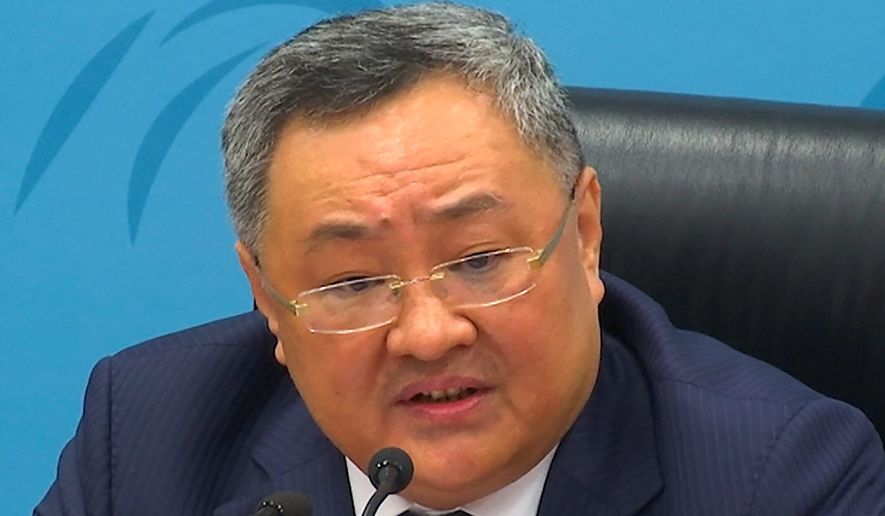The Trump administration on Thursday said it welcomed what it said was China’s apparent openness to joining strategic arms control talks, after Beijing earlier rejected three-way negotiations with Russia on limits to its growing nuclear arsenal.
Fu Cong, head of the Foreign Ministry’s arms control department, told reporters in Beijing this week that China remains opposed to three-way arms talks because of the much larger size of the U.S. arsenal.
But, he added, Beijing would be willing to join such talks — if the United States first slashes its much larger warhead stockpile.
“I can assure you, if the U.S. says that they are ready to come down to the Chinese level, China would be happy to participate the next day,” he said. “But actually, we know that’s not going to happen. We know the U.S. policy.”
But the Trump administration said it views the subtle Chinese shift in their approach to arms talks as a positive sign. China’s announced precondition for such talks — a steep cut in the U.S. warhead stockpile — is not an obstacle to entering talks, U.S. officials said.
State Department spokeswoman Morgan Ortagus seized on the comments Thursday to press the U.S. case that China must be included in talks with Russia on the future of the expiring New START treaty.
“The United States welcomes China’s commitment to engage in arms control negotiations,” Ms. Ortagus said. “As such, prudent next steps will need to include face-to-face meetings between the United States and China.”
Ms. Ortagus said Marshall Billingslea, the special envoy for arms control, will invite Chinese officials to join “good-faith negotiations in Vienna.”
“The United States also recommends that China meet with Russia at an early date to consider next steps for trilateral arms control negotiations,” she said.
“We will all bring different perspectives and objectives to the negotiating table and will surely have disagreements,” Ms. Ortagus added. “But it is time for dialogue and diplomacy between the three biggest nuclear weapons powers on how to prevent a new arms race.”
With the 2011 New START Treaty set to expire early next year, President Trump has said any future arms agreements must include China, which has been rapidly building up both its strategic and tactical nuclear forces.
Mr. Fu said China is not opposed to international disarmament discussions and is prepared to discuss the issue within the United Nations Security Council.
The number of China’s nuclear warheads remains a state secret and U.S. intelligence estimates range from around 200 warheads to as many as 1,000. The U.S. and Russia each have around 6,000 warheads, but New START set limits to 1,550 deployed warheads for both countries.
Chinese nuclear warheads were limited technologically for decades by a lack of miniaturization. That resulted in very large warheads and difficulties delivering them on bombers and missiles.
However, during the 1990s, China through espionage obtained design secrets on the U.S. W88 warhead, a small warhead used on multiple warhead missiles.
As a result the People’s Liberation Army in recent years has begun adding multiple warheads to its large and growing arsenal of intercontinental and intermediate-range missiles.
Russia also entered the recent talks with preconditions that did not preclude the meeting.
Last month, U.S. and Russian arms negotiators met in Vienna. Washington said China was invited to take part but failed to send any representatives. The U.S. delegation pointedly set up the conference room for the talks to include empty chairs with Chinese flags to highlight Beijing’s failure to take part.
During the talks, U.S. officials provided the Russians with a classified intelligence briefing on China’s large-scale nuclear forces build-up.
China is building several new types of nuclear missiles, a new nuclear bomber and new nuclear missile submarines. All of the nuclear forces are being developed largely in secret.
Mr. Fu, the Chinese arms official, also said the attempt to pressure China into joining the arms talks with Russia was a “ploy to divert attention” from the need to extend the New START arms treaty.
“The real purpose is to get rid of all restrictions and have a free hand in seeking military superiority over any adversary, real or imagined,” Mr. Fu said.
• Bill Gertz can be reached at bgertz@washingtontimes.com.




Please read our comment policy before commenting.